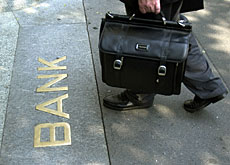Suspicious banking dealings hit record high

Reports from the banking sector on suspicious financial transactions reached an all-time high in 2006, the national money laundering office has revealed.
Overall the number of suspicious transactions reported dropped by 15 per cent on 2005, according to the findings. Just two per cent of the aggregate assets involved the suspected financing of terrorism.
The Annual Report of the Money Laundering Reporting Office Switzerland (MROS), published on Tuesday, say reports from the banking sector rose 22.5 per cent in 2006 to 359.
This represents an all-time high in the number of submissions by the banking sector since the duty to report suspicious financial transactions became effective in 1998.
Accounting for 58 per cent of total reports in 2006, this sector filed the bulk of submission for the first time in five years.
This increase is largely due to an article in the Swiss Criminal Code which provides for the right to report suspicious financial transactions without violating the business-client privilege.
General transactions
In total, the 619 reports on suspicious financial transactions submitted to MROS in 2006 were down 15 per cent, from 729, on 2005.
MROS said this decrease, as in the past few years, was due to a steady decline in the number of reports from the payment transaction services sector and in particular from the money transmitters, culminating in a substantial drop of 53 per cent in 2006.
The payment transaction services sector still accounted for 26.5 per cent of the total reports in 2006.
According to the MROS report, suspicious-transaction reports received in 2006 were generally of good quality, which translated into 82 per cent of reports passed on to the prosecution authorities for further investigation, up from 69 per cent in 2005.
Terrorist finances
The aggregate assets involved in suspicious-transaction reports rose 19.7 per cent from about SFr681 million ($561 million) in 2005 to SFr815 million in 2006.
This increase also correlates to the increase in reports from the banking sector.
Some two per cent of the aggregate assets, or 1.3 per cent of the sum total of reports MROS received in 2006, involved reports filed in relation to suspected terrorism financing.
The number of such reports declined from 20 in 2005 to nine in 2006. Most of the reports were triggered by lists made available publicly with the names of terrorist suspects.
swissinfo with agencies
The number of reports on suspicious transactions submitted to the Money Laundering Reporting Office of Switzerland reached 729 in 2005 – down more than 11% on the previous year.
In 2004 assets amounting to SFr779 million were blocked, but only SFr680 million in 2005.
The Money Laundering Reporting Office is an agency at the Federal Police Office and is a link between the financial sector and the criminal prosecution authorities. It is not to be confused with the Anti-Money Laundering Control Authority, which deals with compliance to due diligence in the banking sector.
Money laundering involves concealing the origins of money earned through criminal activities and releasing it unnoticed into legitimate business activities.
It is most commonly associated with drug trafficking, but not exclusively.
The Swiss Money Laundering Act obliges all financial intermediaries to identify all clients and to establish the beneficial owners of the assets.
They must also report any suspicion of money laundering to the authorities and freeze related assets.

In compliance with the JTI standards
More: SWI swissinfo.ch certified by the Journalism Trust Initiative











You can find an overview of ongoing debates with our journalists here . Please join us!
If you want to start a conversation about a topic raised in this article or want to report factual errors, email us at english@swissinfo.ch.